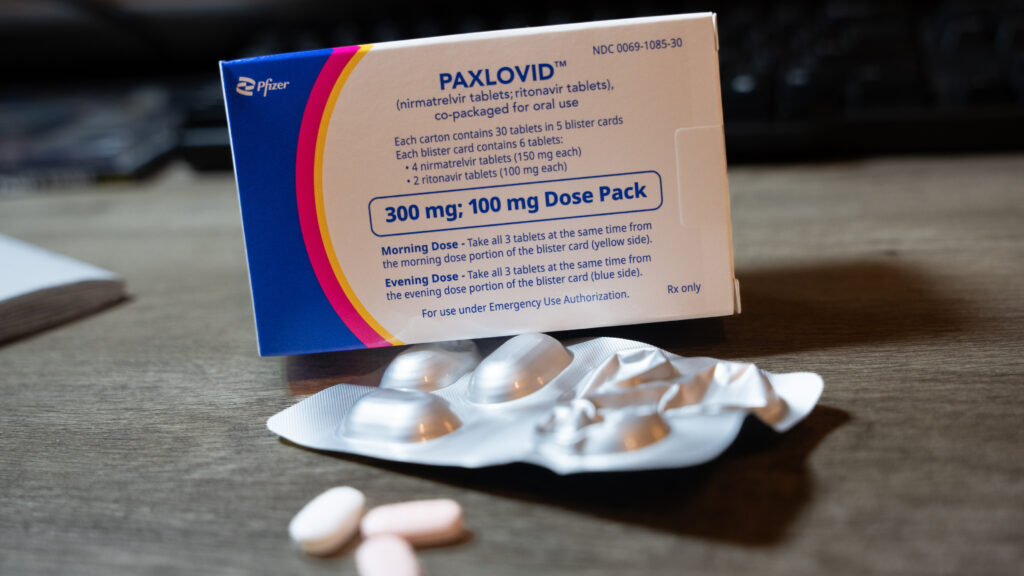A small and preliminary study published Monday seems to indicate that patients receiving the drug Paxlovid are far more likely to experience Covid rebound than those who did not take it.
That conclusion runs counter to previous statements by Pfizer, which makes Paxlovid, and by researchers at the Food and Drug Administration who have argued that while it is not uncommon for people with Covid to have symptoms reemerge after they seem to have recovered, it is not clear that Paxlovid increases the risk of this occurring.
advertisement
The study’s authors and outside experts emphasize that there is no question that Paxlovid is a useful drug that can help keep patients infected with the SARS-CoV-2 virus from being hospitalized. But some also wondered if the results might be an indicator that the current dosing duration of Paxlovid — daily, for five days — is not long enough.
In the study, published in the Annals of Internal Medicine, a peer-reviewed journal, researchers followed 142 people who were enrolled in an ongoing study of Covid from March 2022 to May 2023. Participants were not randomly assigned to receive Paxlovid or a placebo, making it difficult to draw firm conclusions.
The 72 people in the study who received Paxlovid were on average almost two decades older, had received more vaccinations, and were more likely to have suppressed immune systems than those who did not.
advertisement
But the difference was stark. Fifteen people, or 21%, of those who took Paxlovid had their viral levels increase again after they seemed to have gotten better. That compared to one, or 1.8%, of those who did not receive Paxlovid.
“It’s really important to reinforce that Paxlovid is an extremely effective drug for the people that it’s indicated for and our data do not in any way challenge that notion,” said Mark Siedner, an associate professor of medicine at Massachusetts General Hospital and the study’s senior author.
Siedner said that participants in a large clinical trial had an 80% lower risk of being hospitalized or dying. But he said that the study does seem to indicate that people who take Paxlovid might have a one in five chance of rebounding. He said that it might be a reason for people at low risk of developing severe disease not to take the drug.
Myron Cohen, of the Institute for Global Health and Infectious Diseases at the University of North Carolina, Chapel Hill, writes in an editorial accompanying the publication of the study that despite the trial’s weaknesses, Paxlovid “did seem to put patients at greater risk of rebound” and that this may make the decision to give the drug “not straightforward.” He also writes that the most likely reason for this is that “5 days of treatment at the current dosage is inadequate.”
Cohen said in an interview that he hopes the results “shine a light on getting practicing physicians to think about this before they prescribe.”
Both Cohen and Siedner emphasized that the study can’t provide an exact estimate of how often Covid rebound occurs for people who take Paxlovid, because the people who received the drug are so different from those who did not. Such data might need to come from a larger randomized study.
However, Siedner said, although Pfizer’s large trials of the drug showed that the medicine reduced the risk of hospitalization or death, they may have missed cases of rebound. The initial Pfizer studies, he said, collected viral load data on days 5, 10, and 14 of treatment. His study had patients self-collect swabs, which were picked up by courier every three days. When the researchers only looked at samples from days 5, 10, and 14, they missed the cases of Covid rebound.
Blythe Adamson, the founder of Infectious Economics and a researcher at Flatiron Health, said that the the difference between continuous collection and checking only at three time points could explain the discrepancy between the studies, and said she agreed with the authors definitions, calling it “an excellent study with a solid retrospective study design.”
Cohen said that it doesn’t appear that the Covid rebound is occurring because resistant strains of the virus are emerging, but instead because the treatment is failing to take effect. That is why a longer time course might prove beneficial.
In updated results of Pfizer’s pivotal study that were presented at IDWeek last month, researchers said that there was a rate of rebound of 2.3% in the Paxlovid group and 1.7% in the placebo group.
Pfizer declined to comment directly on the results.
“We are continuing to monitor the data, but believe the return of elevated, detected nasal viral RNA (also known as viral rebound or COVID-19 rebound) is relatively uncommon and not uniquely associated with any specific treatment,” Pfizer said in a statement. “We remain very confident in Paxlovid’s clinical effectiveness at preventing severe outcomes from COVID-19 in patients at increased risk.”
“In general, the FDA does not comment on specific studies, but evaluates them as part of the body of evidence to further our understanding about a particular issue and assist in our mission to protect public health,” an FDA spokesperson said.
Siedner said he hopes a study Pfizer is already conducting comparing five-day and 10-day dosing of Paxlovid in immunocompromised patients might shed light on how the drug should be given. Cohen also noted that a new antiviral being developed by Shionogi could potentially cause less rebound.

